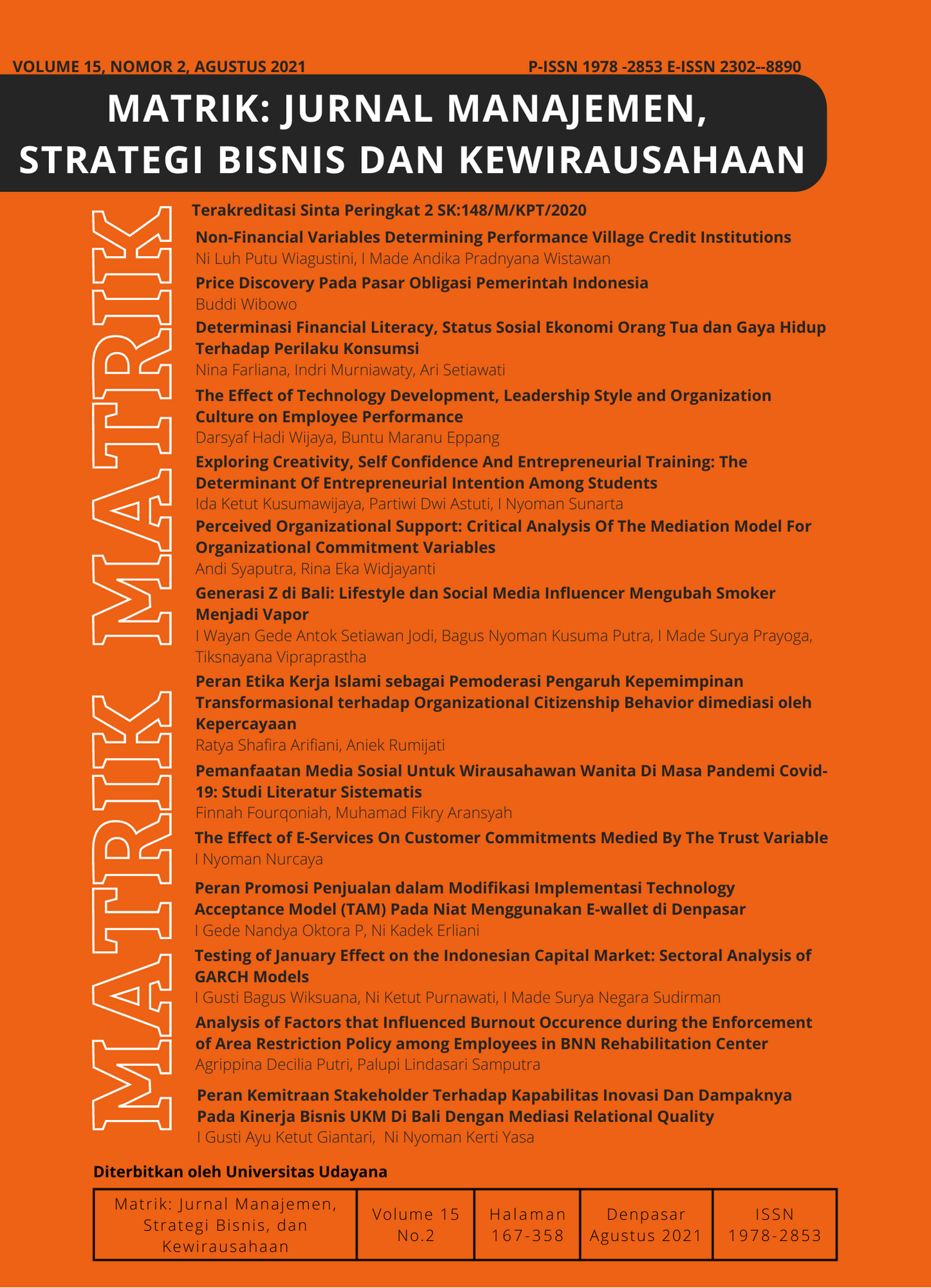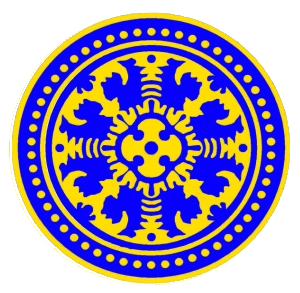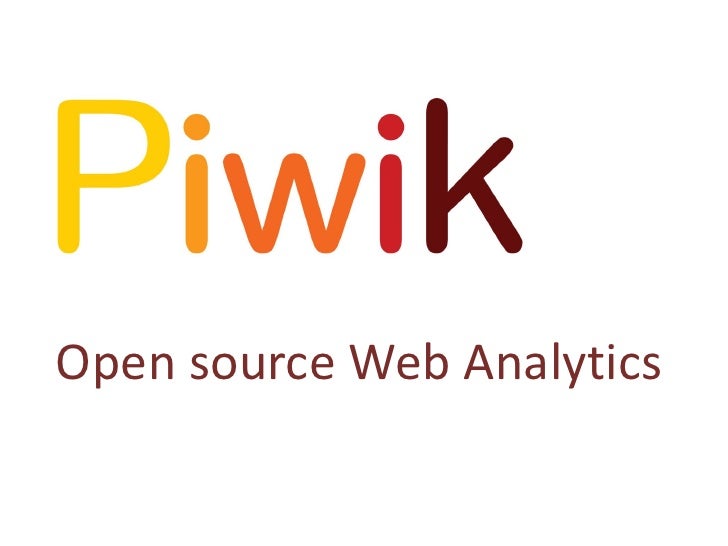The Effect of Technology Development, Leadership Style and Organization Culture on Employee Performance
Abstract
This study aims to determine the influence between the development of information technology systems, leadership style, organizational culture, employee performance in the travel industry in South Sulawesi. The survey method approach was used in this study to examine the variables of developing information technology systems that developed with 141 respondents in the travel industry. Determination of the sample using purposive sampling method. The hypothesis was tested using the structural equation modeling (SEM) data analysis method with the help of software, namely Analysis Moment of Structure (AMOS) 20. The results of the discussion of this study explain that: 1) The development of information technology systems has a positive and significant effect on organizational culture. This means that the better the quality of electronic services, the more work culture will increase in the tourism travel industry in South Sulawesi. 2). Leadership style has a positive and significant effect on organizational culture. This means that the higher the level of leadership style, the higher the organizational culture in the travel industry in South Sulawesi. 3). The development of information technology systems has a positive and significant effect on employee performance. This means that the better the quality of electronic services, the more employee performance in the travel industry in South Sulawesi. 4) Leadership style has a positive and significant effect on employee performance. This means that the higher the level of leadership style, the higher the employee's performance in the travel industry in South Sulawesi. 5) Organizational culture has a positive and significant effect on employee performance.
Downloads
References
Amin Widjaja. Tunggal. (2002). Internal Auditting (suatupengantar). Jakarta :Harvarindo.
Asmini, Lia dan Bambang Suratman. (2014). Pengaruh Penggunaan Teknologi Komunikasi terhadap Tingkat Kinerja Karyawan Di Kantor Pos Medan. Jurnal Administrasi Perkantoran, 2(2)
Bass, B. M., & Avolio, B. J. (1993). Improving organizational effectiveness through transformational leadership. Thousand Oaks, CA: Sage Publications.
Bass, B. M., Avolio, B. J., Jung, D. I., & Berson, Y. (2003). Predicting unit performance by assessing transformational and transactional leadership. Journal of Applied Psychology, 88, 207–218
Bass, B.M. (1985). Leadership and Performance Beyond Expectations. New York: The Free Press
Bernardin and Russel. (1993). Human Resource Management. New Jersey : International Editions Upper Saddle River, Prentice Hall
Bono, J. E. dan Judge, T. A. 2003. Core Self‐Evaluations: A Review of the Trait and its Role in Job Satisfaction and Job Performance. European Journal of Personality, Vol 17: 5-8.
Budhi, I. G. K. T. T. P.. (2018). Pengaruh teknologi informasi terhadap budaya organisasi dan kinerja karyawan di stmik stikom Bali. Jurnal media aplikom, 10(2)
Buhalis, D., 1998, Strategic use of information technologies in the tourism industry, Tourism Management, Vol.19(5), pp.409-421.
Dauda, D. Y., & Akingbade, W. A. (2011). Technological change and employee performance in selected manufacturing industry in lagos state of nigeria. Australian Journal of Business and Management Research, 12.
Davis. (1989). Perceived Usefulness, Perceived Ease of Use, and User Acceptance of Information Technology. MIS Quarterly, 13(3) pp. 319-340.
Dedek kurniawan, Gultom, 2014. Pengaruh Budaya Organisasi Perusahaan dan Motivasi terhadap Kinerja Karyawan pada PT. Perusahaan Gas Negara
Dewi, Fany Rengganis. (2015). Pengaruh Penggunaan Teknologi Informasi Terhadap Kinerja Auditor. Skripsi Sarjana-Universitas Diponegoro Semarang.
Dvir. (2002). Impact of Transformasional Leadership on Follower Development and Performance: A Field Experiment. AMJ Pres
Ellitan, L., (2002), "Praktik-praktik Pengelolaan Sumber Daya Manusia dan Keunggulan Kompetitif Berkelanjutan", journals/management.
Foster, George. (1986) Financial Statement Analysis, Second Edition, Singapore: Prentice-hall.
George, Jenifer M., and Jones, Gareth R. (2005). Understanding and Managing Organization Behavior. 4th Edition. New Jersey: Pearson, Prentice Hall
Gibson, James L. (2005). Organizations Behavior, Structure, Process. Twelfth Edition. Boston: McGraw-Hill Irwin. Terjemahan Wiliyanto, Salemba Empat
Hair, dkk. (2006). Multivariate Data Analysis Pearson International Edition Edition 6. New Jersey
Harsh, H. and Prasad, A. (2021), "Employment relations and perceived organizational performance: the moderating role of technological intensity", Employee Relations, Vol. 43 No. 1, pp. 109-130. https://doi.org/10.1108/ER-02-2019-0119
Hitt, Michael. A., Robert E. Hoskisson, & Hicheon Kim. (1997). International diversification: Effects on innovation and firm performance in product-diversified firms. Academy of Management Journal, 40(4), 767-798. http://dx.doi.org/10.2307/256948
Humphreys, J.H. (2002). Transformational Leader Behavior, Proximity and Successful Services Marketing. Journal of Services Marketing, 16(6), pp. 487-502
Huselid, M. A. 1995. The Impact of Human Resource Management Practices on Turnover, Productivity, and Corporate Financial Performance.Academy of Management Journal, 38: 635-672.
Imran, Muhammad. (2014). Impact of Technological Advancement on Employee Performance in Banking Sector. International Journal of Human Resource Studies, 4(1)
Law J., Garrett Z., Nye C. (2004). The efficacy of treatment for children with developmental speech and language delay/disorder: a meta-analysis. J. Speech Lang. Hear. Res. 47, 924–943.
Lintong, Nelsye Natalina. (2015). Strategi Bersaing Biro Perjalanan Wisata Alindo Dewata Tours Bali. Jurnal Master Pariwisata (JUMPA), 2 (1) : 117 – 131
Lohmann, M., & Schmucker, D. J. (2009). Internet Research Differs from Research on Internet Users. Tourism Review, 64(1), 32-47.
Mangkunegara, A.A Anwar Prabu., (2005). Manajemen Sumber daya Manusia Perusahaan. Bandung : PT Remaja Rosdakarya
Marsono, Edi. 2015. Pengaruh Budaya Organisasi Dan Kepemimpinan Terhadap Kinerja Pegawai (Studi Tentang Kinerja Pegawai Administrasi Pada Fakultas Keguruan Dan Ilmu Pendidikan Universitas Lampung). Masters Thesis, Universitas Lampung
Meyer & Goes (1988). Organizational Assimilationof Innovations:A Multilevel Contextual Analysis. Academy of Management Journa. 31(4): 897-923
Meyer, A. D. 1985. Hospital capital budgeting: Fusion of rationality, politics and ceremony. Health Care Management Review. 10(2): 17-27
Mumford, Troy V., Campion, Michael A., Morgeson, and Frederick P. (2000). The Leadership Skills Strataplex: Leadership Skill Requirements Across Organizational Levels. The Leadership Quarterly.
Nohria, N. and Gulati, R. (1966). Is Slack Good or Bad for Innovation?. Academy of Management Journal, 39,pp: 1245 -1264.
Ojo, A.O., Tan, C.N.-L. and Alias, M. (2020), "Linking green HRM practices to environmental performance through pro-environment behaviour in the information technology sector", Social Responsibility Journal, Vol. ahead-of-print No. ahead-of-print. https://doi.org/10.1108/SRJ-12-2019-0403
Pavitt, K., 1990. What we Know about the Strategic Management of Technology, California Management Review, Vol.32, No.3 pp.17-26
Poon, A. (1993). Tourism, Technology and Competitive Strategies. Wallingford: C.A.B International
Porwani, S. (2010). Pengaruh budaya organisasi terhadap kinerja karyawan studi kasus pada PT. Tambang Batubara Bukit Asam (Persero) Tanjung Enim. Jurnal Ilmiah (II).
Pradiatiningtyas, D. (2015). Analisa Buying Behavior Pada Online Travel Agent. Khasanah Ilmu-Jurnal Pariwisata Dan Budaya, 6 (2)
Pramudyo, Anung (2014). Pengaruh Citra Merek Terhadap Loyalitas Melalui Kepuasaan SebagaiIntervening. JBMA Vol I No. 1.
Ratna, S., Nayati Utami, H., Siti Astuti, E., Wilopo, and Muflih, M. (2020), "The technology tasks fit, its impact on the use of information system, performance and users’ satisfaction", VINE Journal of Information and Knowledge Management Systems, Vol. 50 No. 3, pp. 369-386. https://doi.org/10.1108/VJIKMS-10-2018-0092
Robbins, Stephen P. 2006 Perilaku Organisasi. Jakarta: Salemba Empat
Schein E.H. (2004). Organizational Culture and Leadership. San Francisco: Jossey-Bass
Schroeder, R. & Sohal, A, (1999). Organizational characteristics associated with AMT adoption: toward a contingency framework. International Journal of Operation & Production Management, 19 (12), pp. 1270-1291
Shea, Christine M., (1999). The Effect of Leadership Style on Performance Improvement on a Manufacturing Task. Journal of Business, Vol. 72, No. 3, 407-421.
Sheldon, K. M. (1997). Creativity and goal conflict. Creativity ResearchJournal #, 299-306
Suhana. (2007). Relationship Analysis of Leadership Style, HRM Practices, Organizational Culture, Commitment and Performance (Study in People Crediting Bank (BPR) in Central Java). Usahawan No. 10, TH XXXVI, Oktober 2007, h. 47- 53
Ulva, R. (2018). Pengaruh Budaya Organisasi Terhadap Keberhasilan Implementasi Human Resource Information System di telkom Menado. Jurnal administrasi Bisnis, 6(2)
Yammarino, F.J., W.D. Spangler and B.M. Bass. (1993). Transformational leadership and performance: A longitudinal investigation. Journal Leadership Quarterly, 4(1), pp.81-102
Yukl, G. (2005). Kepemimpinan Dalam Organisasi, Edisi kelima, PT Indeks, Jakarta.
 This work is licensed under a Creative Commons Attribution-ShareAlike 4.0 International License.
This work is licensed under a Creative Commons Attribution-ShareAlike 4.0 International License.

















